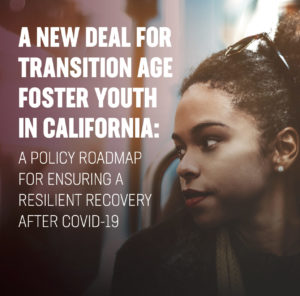Advocacy Reports & Resources, Foster Care & Extended Foster Care
Just Released: A New Deal for Transition Age Foster Youth in California
The Youth Law Center is proud to share a new policy brief, A New Deal for Transition Age Foster Youth in California: A Policy Roadmap for Ensuring a Resilient Recovery after COVID-19. The brief proposes critical short- and long-term policy action steps that build on California’s emergency policy response for transition age youth who are in foster care or have recently exited care in the aftermath of the COVID-19 public health crisis and the resulting economic recession.
Research shows that even in pre-pandemic times, young adults who have been in foster care had poorer educational and employment outcomes compared to other youth of the same age, and were more likely to experience homelessness. Nearly ten years ago, California launched its extended foster care program to provide a supportive pathway to independence for foster youth up to age 21 and, ultimately, improve their short- and long-term outcomes in the context of a strong economy and record low unemployment. Now, the pandemic has resulted in grave economic and health consequences that have made extended foster care the primary safety net for transition age foster youth who have suddenly lost access to their college dormitories, jobs, personal and family connections, and healthcare and supportive services. These consequences disproportionately harm youth of color, who comprise the overwhelming majority of transition age youth in foster care. Hearing the call of these youth, California’s Governor Newsom and the Legislature worked with YLC and advocates across the state to modify the extended foster care program requirements to ensure that youth can remain in the program past the maximum age, with flexibility if they can not meet the usual work and school requirements, and with the ability to communicate with their county placement worker remotely. Some former foster youth will also be able to stay in their housing programs for a longer period of time.
The Youth Law Center applauds these swift emergency actions to prevent homelessness, poverty, and disconnectedness among transition age foster youth, but our work to protect youths’ futures is just beginning. This brief proposes additional emergency measures, like preventing abrupt discharges from housing programs and working with public health agencies to provide targeted services for expectant and parenting youth. We believe that the current crisis presents a unique opportunity to reflect on the past ten years of extended foster care and the overall safety net that exists for California’s young adults who are in or exiting foster care to ensure our supports are youth-centered, developmentally informed, and effective. To that end, this brief proposes several long-term policy reforms to ensure that the safety net that exists for transition age foster youth is both responsive and resilient, both in everyday crises and in global crises like the current one. One of these reforms—creating an automatic extension for 21 year olds when they age out of extended foster care during a State of Emergency—is currently moving through the California Legislature in Senate Bill 912, authored by Senator Jim Beall and co-sponsored by Youth Law Center and our partners at Children’s Law Center and Journey House.
We look forward to working with all of our partners to work toward a resilient recovery—a New Deal—for transition age foster youth.
